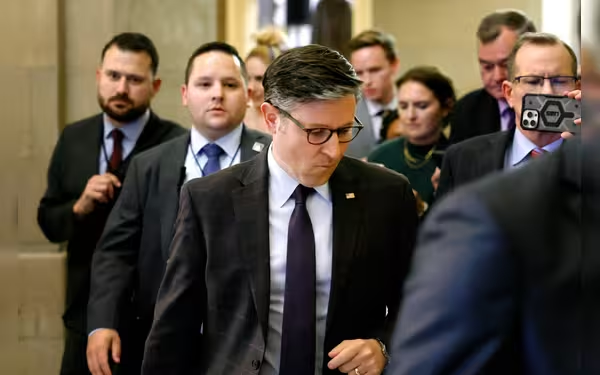Saturday, September 28, 2024 11:23 PM
US House Republicans Propose Stopgap Bill to Prevent Government Shutdown
- Republicans introduce three-month funding bill to avert shutdown.
- Bipartisan agreement possible as Democrats express optimism.
- Urgent deadline looms for raising debt ceiling by January 2024.
 Image Credits: arabnewspk
Image Credits: arabnewspkUS House Republicans unveil a three-month stopgap bill to prevent a government shutdown ahead of critical elections.
In a bid to prevent a looming government shutdown, Republican Speaker of the US House of Representatives, Mike Johnson, has introduced a three-month stopgap funding bill. This proposal comes as lawmakers scramble to address the urgent need for funding before the current budget expires on September 30, 2023. The bill is particularly significant as it seeks to avert a partial government shutdown that could disrupt services and impact thousands of federal workers just weeks before the critical November 5 elections.
Johnson's plan, outlined in a letter to his colleagues, is designed to extend government funding through December 20, 2023. Notably, it does not include an immigration-related measure that former President Donald Trump had insisted upon, which would require proof of citizenship for voter registration. This exclusion aligns with the stance of Democratic Senate Majority Leader Chuck Schumer, who has advocated for a straightforward extension of government funding.
In his letter, Johnson emphasized the political ramifications of a government shutdown, stating, "As history has taught and current polling affirms, shutting the government down less than 40 days from a fateful election would be an act of political malpractice." This statement underscores the urgency and potential consequences of failing to reach an agreement.
Democrats, including Schumer and House Minority Leader Hakeem Jeffries, have expressed optimism about the possibility of a bipartisan agreement. Jeffries welcomed the proposal, indicating that House Democrats would assess it after previously rejecting a Republican plan that he described as an attempt to push through partisan policies.
With the House narrowly controlled by Republicans at a margin of 220-211, the dynamics of the vote are crucial. The previous proposal for a six-month funding extension, which included the controversial voter-registration measure, was rejected by the House. This measure was deemed unnecessary by Democrats and advocates for democracy, as it is already illegal for non-citizens to vote in federal elections.
Looking ahead, Congress faces another pressing deadline on January 1, 2024, when lawmakers must raise the nation’s debt ceiling to avoid defaulting on over $35 trillion in federal government debt. This looming deadline adds another layer of urgency to the current funding discussions.
Additionally, the proposed bill includes $231 million in extra funding for the US Secret Service. This allocation comes in response to recent security threats against Trump, including an assassination attempt in July and another incident involving a gunman near a Florida golf course where Trump was playing.
As the clock ticks down to the funding deadline, the stakes are high for both parties. A government shutdown could have far-reaching consequences for federal employees and the services they provide. It is imperative for lawmakers to come together and find common ground to ensure the government remains operational and to safeguard the interests of the American people. The next few days will be critical in determining whether a bipartisan solution can be achieved, or if political divisions will lead to a shutdown that could disrupt the lives of many.













